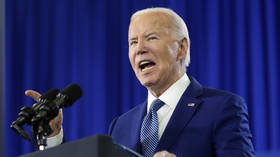ROAR: Medvedev promises “gradual” reform of political system

The media have described the session of the State Council as “the first discussion about the current political system in the history of modern Russia.”
Speaking at the meeting that took place on January 22, President Dmitry Medvedev “supported the fundamentals of the political system,” said Pavel Salin of the Center for Political Conjuncture.
The meeting was prompted by the opposition’s complaints after alleged fraud during regional elections held in autumn. Three parties even stood up and left parliament on October 14 in protest. The opposition spoke about “thousands of irregularities, but filed only a few dozen suits in court,” Salin said.
Vremya Novostey daily noted that the session of the State Council was “the rage of democracy,” stressing that even leaders of three parties not represented in parliament – Yabloko, Patriots of Russia and the Right Cause – had their say. Also, among regional leaders who spoke at the meeting, was Nikolay Vinogradov, the only Communist governor who heads Vladimir Region.
The leaders of some parties had promised to propose important initiatives to reform the current political system that “prevents them from winning elections,” but they failed to do this, the media say.
The president, in turn, has sent a signal to opposition parties that “they are needed and they are important too,” Dmitry Badovsky, deputy director of the Social Systems Institute, told Noviye Izvestia daily.
But leaders of opposition parties“did not dare to use the platform of the State Council to propose substantial ideas of transformation of the political system,” Nezavisimaya Gazeta daily said. “Their statements came to the criticism of the outcomes of October elections, complaints against governors and the legal system.”
It seemed that President Medvedev’s address “did not leave a slight chance for the opposition,” the paper said. “He did not reveal his disappointment at the fact that the opposition’s complaints about the results of the October elections have not been confirmed.”
Georgy Boos, governor of Kaliningrad Region, “was even tougher”, and described the unfulfilled promises of the opposition “to cover courts with suits as political squabbles,” the daily stressed.
Speaker of the Federation Council and leader of Fair Russia Sergey Mironov explained that “it is senseless to file suits,” the papers said. Gennady Zyuganov, the head of the Communist Party, in turn, “asked regional leaders to stop persecuting the party’s activists, which also was not a new statement.
“These passages the leaders of parliamentarian opposition dissolved all the significant initiatives that they had wanted to declare,” the paper said.
Prior to the session of the State Council, observers wondered who would represent the government which “did not interfere in the preparation of the meeting,” the daily said.
Prime Minister Vladimir Putin, who was “invited to the meeting as the leader of United Russia had to set the strategic direction of the development [of the political system],” the paper said.
“He called for a careful improvement of the political system, with a fair bit of conservatism, to avoid its ‘Ukrainization’,” it added. At the same time, Putin did not allow those present to question “the rights of political reform of the last decade,” the daily noted.
The State Council has sent “signals” to the elites both at the federal and regional levels, political analyst Oksana Goncharenko said. Federal political institutes will be reformed “gradually,” and they will be based on legal and state mechanisms that have already been created, she wrote in a commentary on website ancentr.ru.
At the same time, the federal center has prompted regional administration to ease influence on the electoral process, the analyst said. New modern electronic systems of vote counting at polling stations should help fulfill this task, she added.
An important signal for regional leaders was the president’s statement about the need “to secure political pluralism,” she said. "The cooperation of governors with opposition parties might widen the format of discussion on key political issues, which should lead in the end to increase the effectiveness of the decisions,” she added.
At the same time, such initiatives of Boris Gryzlov, Duma speaker and the leader of the ruling United Russia Party as to create “the so-called super regions,” did not find its supporters at the meeting, Nezavisimaya Gazeta said.
Party leaders assessed the results of the session differently. The Communist Party leader Gennady Zyuganov told Kommersant daily that he “was satisfied with the president’s statement about the need to modernize the political system.”
Vladimir Zhirinovsky, the head of the Liberal Democratic Party (LDPR), told the daily that "United Russia and governors should have been criticized more so that they stop pressing opposition.”
The meeting of the State Council showed that neither the Communist Party, nor LDPR did not raise a single issue that “was not conformed to the president’s opinion,” political analyst Aleksandr Tsipko said.
As for Medvedev, he stressed that the state of the political system is “not ideal,” which means that he “considers the current state of democracy, at least, as “transitional,” the analyst added.
If political modernization in Russia will be only “the optimization of the current very imperfect model,” then one should not expect a positive strategic effect, warned Vitaly Tretyakov, chief editor of Political Class magazine. The main issue is not the speed of the reform, but what is meant by progress of the political system, he wrote in Izvestia daily.
Sergey Mitrokhin, leader of the liberal Yabloko party, which is not represented in parliament, did not like the idea of “fair conservatism in political reform,” Kommersant said.
However, he was satisfied with the fact that non-parliamentarian opposition was allowed to speak at the meeting. “It is good that an opportunity has arisen to discuss directly key issues of the country’s development with chief persons,” he said.
Sergey Borisov, RT













